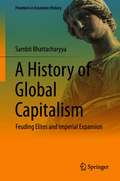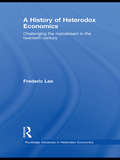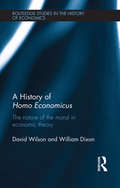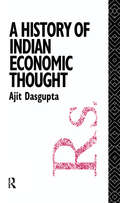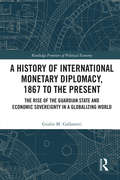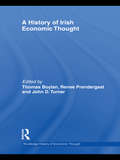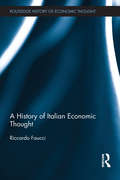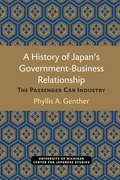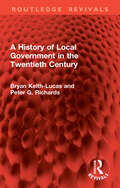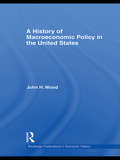- Table View
- List View
A History of Franklin County, North Carolina (Brief History)
by Eric MedlinThe story of Franklin County is one of remarkable change and growth over the past 250 years. From its Native American roots, this corner of the eastern Piedmont has become a center for tobacco plantations, textile mills and cotton cultivation. It has seen seminal moments in the history of public education, Methodism and even capital punishment. One governor called Louisburg home, while several more have visited and even presidents have made brief stops. Local historian Eric Medlin narrates the history of one of the most exceptional parts of the great state of North Carolina.
A History of Global Capitalism: Feuding Elites and Imperial Expansion (Frontiers in Economic History)
by Sambit BhattacharyyaThe book sets out to explore the economic motivations of imperial expansion under capitalism. This undoubtedly is related to two fundamental research questions in economic sciences. First, what factors explain the divergence in living standards across countries under the capitalist economic system? Second, what ensures internal and external stability of the capitalist economic system? The book adopts a unified approach to address these questions. Using the standard growth model it shows that improvements in living standards are dependent on access to raw materials, labour, capital, technology, and perhaps most importantly 'economies of scale'. Empires ensure scale economy through guaranteed access to markets and raw materials. The stability of the system depends on growth and distribution and it is not possible to have one without the other. However, the quest for growth and imperial expansion implies that one empire invariably comes into conflict with another. This is perhaps the most unstable and potentially dangerous characteristic of the capitalist system. Using extensive historical accounts the book shows that this inherent tension can be best managed by acknowledging mutual spheres of influence within the international system along the lines of the 1815 Vienna Congress. This timely publication addresses not only students and scholars of economics, geography, political science, and history, but also general readers interested in a better understanding of economic development, international relations, and the history of global capitalism.
A History of Heterodox Economics: Challenging the mainstream in the twentieth century (Routledge Advances in Heterodox Economics)
by Frederic LeeEconomics is a contested academic discipline between neoclassical economics and a collection of alternative approaches, such as Marxism-radical economics, Institutional economics, Post Keynesian economics, and others, that can collectively be called heterodox economics. Because of the dominance of neoclassical economics, the existence of the alternative approaches is generally not known. This book is concerned with the community history of heterodox economics, seen primarily through the eyes of Marxian-radical economics and Post Keynesian economics. Throughout the 20th century neoclassical economists in conjunction with state and university power have attacked heterodox economists and tried to cleanse them from the academy. Professor Lee, his groundbreaking new title discusses issues including the contested landscape of American economics in the 1970s, the emergence and establishment of Post Keynesian economics in the US and the development of heterodox economics in Britain from 1970 to 1996.
A History of Homo Economicus: The Nature of the Moral in Economic Theory (Routledge Studies In The History Of Economics Ser. #141)
by David Wilson William DixonA key issue in economic discourse today is the relation (or lack of it) between economic behaviour and morality. Few (presumably) would want to deny that human beings are in some sense moral or ethical creatures, but the devil is in the detail. Should we think of economic behaviour as an essentially amoral process – a process adequately characterised by a means-ends rationality – into which any number of subjective ethical concerns or orientations may be intruded to give a particular action its determinate moral content? Or is it rather the case that our moral being runs deeper than this, in the sense that all of our behaviour – ‘economic’ or otherwise – is enabled or capacitated by a competence that is fundamentally ethical in character? With new analyses of the work of Hobbes and Smith, Dixon and Wilson offer a fresh approach to the debate surrounding economics and morality with a novel discussion of the self in economic theory. This book calls for a change in the way that the relation between economic behaviour and morality is understood – from an understanding of morality as a kind of preference that informs certain types of other-regarding behaviour (the way that modern economics understands the relationship), to an idea of morality as a competence that enables or, rather, conditions the possibility of all forms of human behaviour, other-regarding or not. Offering a new insight on homo economicus, this book will be of great interest to all those interested in the history of economics and of economic thought.
A History of Howard Johnson's: How a Massachusetts Soda Fountain Became an American Icon (American Palate Ser.)
by Anthony Mitchell SammarcoThe iconic restaurant chain that defined Americana by introducing twenty-eight flavors of ice cream, &“tendersweet&” clam strips, grilled &“frankforts,&” and more. Popularly known as the &“Father of the Franchise Industry,&” Howard Johnson delivered good food and fair prices—a winning combination that brought appreciative customers back for more. The attractive white Colonial Revival restaurants, with eye-catching porcelain tile roofs, illuminated cupolas, and sea blue shutters, were described in Reader&’s Digest in 1949 as the epitome of &“eating places that look like New England town meeting houses dressed up for Sunday.&” Learn how Johnson created an orange-roofed empire of ice cream stands and restaurants that stretched from Maine to Florida . . . then all the way across the country.
A History of Human Rights Society in Singapore: 1965-2015 (Politics in Asia)
by Jiyoung SongTo celebrate Singapore’s fiftieth anniversary for its independence from Malaysia in 2015, 35 students, academics and activists came together to discuss and write about pioneering Singaporean human rights activists and their under-reported stories in Singapore. The city-state is known for its remarkable economic success while having strict laws on individual freedom in the name of national security, public order and racial harmony. Singapore’s tough stance on human rights, however, does not negate the long and persistent existence of a human rights society that is little known to the world until today. This volume, composed of nine distinctive chapters, records a history of human rights activists, their campaigns, main contentions with the government, survival strategies and other untold stories in Singapore’s first 50 years of state-building.
A History of Indian Economic Thought (The Routledge History of Economic Thought)
by Ajit K. DasguptaThe history of Indian economic thought provides rich insights into both economic issues and the workings of the Indian mind. A History of Indian Economic Thought provides the first overview of economic thought in the sub-continent. Arguing that it would be inappropriate to rely on formal economic analyses it draws on a wide range of sources; epics, religious and moral texts for the early period and public speeches, addresses, and newspaper articles for controversies from the nineteenth century onwards. What emerges is a rich mosaic reflecting India's different cultures and civilizations. Hinduism, Buddhism and Islam all address economic issues and British colonial rule had a deep impact, both in propagating Western economic ideas and in provoking Indian theories of colonialism and underdevelopment. The author concludes with chapters on Ghandian economics and on Indian economic thought since Independence.
A History of Industrial Life Assurance
by D. MorrahFirst Published in 2005. Routledge is an imprint of Taylor & Francis, an informa company.
A History of Interest Rates
by Richard Sylla Sidney HomerA History of Interest Rates presents a very readable account of interest rate trends and lending practices over four millennia of economic history. Despite the paucity of data prior to the Industrial Revolution, authors Homer and Sylla provide a highly detailed analysis of money markets and borrowing practices in major economies. Underlying the analysis is their assertion that "the free market long-term rates of interest for any industrial nation, properly charted, provide a sort of fever chart of the economic and political health of that nation." Given the enormous volatility of rates in the 20th century, this implies we're living in age of political and economic excesses that are reflected in massive interest rate swings. Gain more insight into this assertion by ordering a copy of this book today.
A History of Interest and Debt: Ancient Civilizations (Islamic Business and Finance Series)
by Murat UstaoğluWith the spread of interest-based transactions, major problems such as inequality, poverty and debt-based slavery have emerged. Those who practiced professions such as usury have, despite the negative connotations attributed to them, contributed extensively to the construction of the conventional financial system in the global economy, suggesting that the core concepts in this practice need to be analyzed in greater depth and from a historical perspective. This book analyzes the evolution of interest-bearing debt transactions from ancient times to the era of Abrahamic religions. In modern times, interest is strictly prohibited by Islam, but this book demonstrates that it is a practice that has been condemned and legally and morally prohibited in other civilizations, long before Islam outlawed it. Exploring the roots of this prohibition and how interest has been justified as a viable practice in economic and financial transactions, the book offers deep insight into the current nature of finance and economics, and the distinctive features of Islamic finance in particular and enables researchers to further delve into a review of interest-free financing models. Islamic finance, or alternative financial methods, have become extremely popular particularly in the aftermath of global financial crises, suggesting that they will attract further interest in the future as well. The book is primarily aimed at undergraduate and graduate students but, as it avoids the use of technical jargon, it also speaks to a general readership. It will appeal to those who have an interest in financial history, particularly the history of debt as well.
A History of International Civil Aviation: From its Origins through Transformative Evolution
by Alan DobsonFor civil aviation to progress it has never been just about technology and business practices. To go from the rudiments of the early services that plied across short distances in Europe and America to what we experience today required most of all that politicians and policy-makers address the central problems of national sovereignty over air space and national ownership and control over airlines. Those problems have plagued the development of seamless and efficient air services for consumers in the international sphere. One would have thought that international airlines might have led the way towards a uniform globalized system given the nature of their enterprise, but that has definitely not been the case. Sovereignty and security issues have more often than not trumped commercial arguments for a more level playing field for international airlines. There has thus been an on-going tussle between sovereignty, state security and mercantilist practices on the one hand and the ambition for civil aviation to flourish on the other. As one early commentator put it:’ one is convinced that the sovereign state cannot be left without authority over what happens just above its territory, (but) … one shrinks from the idea that aerial navigation could be the object of narrow-minded restrictions.’ How those narrow-minded restrictions were gradually eroded, though still not eliminated, to enable civil aviation to flourish is at the heart of this work. This book will be of direct interest to students of aviation, modern history, international relations and transport. It is also of value to airline industry professionals and government transport departments.
A History of International Monetary Diplomacy, 1867 to the Present: The Rise of the Guardian State and Economic Sovereignty in a Globalizing World (Routledge Frontiers of Political Economy)
by Giulio M. GallarottiThis book is about how the rise of democracy has transformed economics over the past 150 years. As voting was expanded to the masses in the late 19th century, political leaders faced emergent pressures to deliver prosperity to their newly enfranchised populations. This led to the rise of the guardian state: a state whose prime directive was to protect economic growth and employment. Domestic economic goals now became sacrosanct, and if that meant a failure on the international stage to construct solutions to problems in monetary relations, so be it. The book traces the history of international monetary diplomacy during this long period to show how the guardian state has manifested itself, and how it has shaped the course of international monetary relations. Each of the most important international monetary conferences in history is scrutinized with respect to how nations sought to protect the prosperity within their national economies. The historical narratives give a bird’s-eye view into how domestic political priorities have intruded on and shaped economic relations among nations. The book clearly demonstrates the advantages of an interdisciplinary understanding of how politics shapes economics. It will be invaluable reading for scholars and students of international economics, politics and economic history.
A History of Inventing in New Jersey: From Thomas Edison to the Ice Cream Cone
by Linda J. BarthMany Americans are familiar with Thomas Edison's "invention factory" in Menlo Park, where he patented the phonograph, the light bulb and more than one thousand other items. Yet many other ideas have grown in the Garden State, too--New Jerseyans brought sound and music to movies and built the very first drive-in theater. In addition to the first cultivated blueberry, tasty treats like ice cream cones and M&Ms are also Jersey natives. Iconic aspects of American life, like the batting cage, catcher's mask and even professional baseball itself, started in New Jersey. Life would be a lot harder without the vacuum cleaner, plastic and Band-Aids, and many important advances in medicine and surgery were also developed here. Join author Linda Barth as she explores groundbreaking, useful, fun and even silly inventions and their New Jersey roots.
A History of Iowa Wine: Vines on the Prairie (American Palate)
by John N. PeragineIowa has a history with grapevines that goes back more than a century. New York lawyer Hiram Barney obtained a tract of land in southeast Iowa as part of the Half-Breed program following the American Indian Wars and created the White Elk Winery. German settlers in Amana tended community vineyards for communal wines. Before Prohibition, the Council Bluffs Grape Growers Association grew grapes and shipped them eastward by the ton. In the early 1900s, the state was among the nation's top producers of grapes. Pesticides, weather and government subsidies ended the time of the vines of the prairie until their recent return. Author John N. Peragine details the rise, fall and resurgence of the industry in the Hawkeye State.
A History of Irish Economic Thought (The\routledge History Of Economic Thought Ser. #11)
by Thomas BoylanFor a country that can boast a distinguished tradition of political economy from Sir William Petty through Swift, Berkeley, Hutcheson, Burke and Cantillon through to that of Longfield, Cairnes, Bastable, Edgeworth, Geary and Gorman, it is surprising that no systematic study of Irish political economy has been undertaken. In this book the contributors redress this glaring omission in the history of political economy, for the first time providing an overview of developments in Irish political economy from the seventeenth to the twentieth century. Logistically this is achieved through the provision of individual contributions from a group of recognized experts, both Irish and international, who address the contribution of major historical figures in Irish political economy along the analysis of major thematic issues, schools of thought and major policy debates within the Irish context over this extended period.
A History of Italian Cinema: Cinema Paradiso? (Film und Bewegtbild in Kultur und Gesellschaft)
by Irmbert SchenkThis book provides a complete description of the development of Italian film and cinema from its beginnings in 1895 until today. Special emphasis is placed on those periods in which Italian film history became aesthetically decisive for world cinematography: silent film of the 1910s, neorealism after World War II, and auteur and genre cinema around 1960. And then on the multifaceted development up to the present day, which still guarantees films from Italy a significant place in international cinema. The chapters are introduced with compact descriptions of Italy's political and social history and the institutional formation of film and cinema. This is the basis for the extensive examination of genres and films. The film analyses also include a look at the reception by the audiences.
A History of Italian Economic Thought (The Routledge History of Economic Thought)
by Riccardo FaucciThis book provides the non-Italian scholar with an extensive picture of the development of Italian economics, from the Sixteenth century to the present. The thread of the narrative is the dialectics between economic theory and political action, where the former attempts to enlighten the latter, but at the same time receives from politics the main stimulus to enlarge its field of reflection. This is particularly clear during the Enlightenment. Inside, this book insists on stressing that Galiani, Verri, and Beccaria were economists quite sensitive to practical issues, but who also were willing to attain generally valid conclusions. In this sense, "pure economics" was never performed in Italy. Even Pareto used economics (and sociology) in order to interpret and possibly steer the course of political action. Within this book it illustrates the Restoration period (1815-48). There was a slowdown of the economists' engagement, due to an adverse political situation, that prompted the economists to prefer less dangerous subjects, such as the relationship between economics, morals, and law (the main interpreter of this attitude was Romagnosi). After 1848, however, in parallel with the Risorgimento cultural climate, a new vision of the economists' task was eventually manifested. Between economics and political Liberalism a sort of alliance was established, whose prophet was F. Ferrara. While the Historical school of economics of German origin played a minor role, Pure Economics (1890-1940 approx.) had a considerable success, as regards both economic equilibrium and the theory of public finance. Consequently, the introduction of Keynes's ideas was rather troubled. Instead, Hayek had an immediate success. This book concludes with a chapter devoted to the intense relationships between economic theories, economic programmes and political action after 1945. Here, the Sraffa debate played an important role in stimulating Italian economists to a reflection on the patterns of Italian economy and the possibilities of transforming Italy's economic and social structure.
A History of Italian Wine: Culture, Economics, and Environment in the Nineteenth through Twenty-First Centuries
by Paolo Tedeschi Manuel Vaquero Piñeiro Luciano MaffiThis book analyzes the evolution of Italian viticulture and winemaking from the 1860s to the new Millennium. During this period the Italian wine sector experienced a profound modernization, renovating itself and adapting its products to international trends, progressively building the current excellent reputation of Italian wine in the world market.Using unpublished sources and a vast bibliography, authors highlight the main factors favoring this evolution: public institutional support to viticulture; the birth and the growth of Italian wine entrepreneurship; the improvement in quality of the winemaking processes; the increasing relevance of viticulture and winemaking in Italian agricultural production and export; and the emergence of wine as a cultural product.
A History of Japan’s Government-Business Relationship: The Passenger Car Industry (Michigan Papers in Japanese Studies #20)
by Phyllis A. GentherDespite the economic and political importance of the U.S.-Japan relationship and the extensive attention paid to automotive trade, few American scholars or policy makers are familiar with the history of Japanese government-business relations, either generally or for specific industries such as passenger cars. This book hopefully helps in a small way to fill that gap in our knowledge and, thus, to help strengthen the foundation from which we make public policy decisions about bilateral trade. [ix]
A History of Land Use in Mongolia
by Elizabeth EndicottAn illustrated history of the pastoral nomadic way of life in Mongolia, this book examines the many challenges that Mongolian herders continue to face in the struggle over natural resources in the post-socialist free market era.
A History of Law and Lawyers in the GATT/WTO
by Gabrielle MarceauHow did a treaty that emerged in the aftermath of World War II and barely survived its early years evolve into one of the most influential organizations in international law? This unique book brings together original contributions from an unprecedented number of eminent current and former GATT and WTO staff members--including many current and former Appellate Body members--to trace the history of law and lawyers in the GATT/WTO and explore how the nature of legal work has changed over the institution's sixty-year history. It paints a fascinating portrait of the development of the rule of law in the multilateral trading system and allows some of the most important names in GATT and WTO history to share their stories and reflect on the WTO's remarkable journey from a "provisionally applied treaty" to an international organization defined by its commitment to the rule of law. This volume provides a new perspective on the role of law and lawyers in the GATT/WTO Secretariats that highlights the multiple roles of lawyers and non-lawyers in enhancing the rule of law in the multilateral trading system.
A History of Leadership
by Morgen WitzelThe evolution of leadership into a widely accepted concept occurred without any shared understanding and acceptance of its meaning and relevance in contemporary society. Why do some people become leaders? What is the source and legitimacy of leadership power? This book journeys into the heart of the relationship between leaders and followers, the social space and the arena where both contest and collaboration take place and leadership itself is played out. In the book, Morgen Witzel moves beyond traditional traits and skills framing, offering a fresh, historical analysis that involves many different actors with different motives and needs. By analysing the evolution of power relationships, the book analyses the interactions around how power is used and control is bargained for to illuminate the centrepiece of leadership. A wide-ranging history of a slippery subject, this book provides students, scholars and reflective practitioners with an empirical, historical base on which to test their own ideas and experiences.
A History of Local Government in the Twentieth Century (Routledge Revivals)
by Peter G. Richards Bryan Keith-LucasOriginally published in 1978, this book covers all aspects of the development of local authorities; the changing types of people who worked in them – solicitors, trade unionists, politicians and reformers; the growing influence of political parties in local affairs; the widening concept of the purpose of local government and the attendant financial problems; the partnership and conflict with central government; the rise of the associations of local authorities and their influence over the many proposals to change the structure of local government in the late 20th Century.
A History of London's Prisons
by Geoffrey HowseThe author of The A-Z of London Murders takes readers behind the bars of the city’s numerous jails and tells the tales of their most infamous inmates. London has had more prisons than any other British city. The City’s “gates” once contained prisons but probably the most notorious of all was Newgate, which stood for over seven hundred years. The eleventh-century Tower of London was used as a prison for a variety of high profile prisoners from Sir Thomas More to the Krays. Discover the background of a variety of historic places of incarceration such as the Clink, the King’s Bench Prison, and debtors’ prisons such as the Fleet Prison and the Marshalsea. “Lost” prisons such as the Gatehouse in Westminster, Millbank Penitentiary, Surrey County Gaol in Horsemonger Lane, the House of Detention, Coldbath Fields Prison, and Tothill Fields Bridewell Prison are also described in detail; as are more familiar jails: Holloway, Pentonville, Brixton, Wandsworth, and Wormwood Scrubs. In A History of London’s Prisons, Geoffrey Howse delves not only into the intricate web of historical facts detailing the origins of the capital’s prisons but also includes fascinating detail concerning the day-to-day life of prisoners—from the highly born to the most despicable human specimens imaginable—as well as those less fortunate individuals who found themselves through no fault of their own “in the clink,” some soon becoming clients of the hangman or executioner.
A History of Macroeconomic Policy in the United States (Routledge Explorations in Economic History)
by John H. WoodThis book examines the controlling influences that drive macroeconomic policies in the United States. It addresses the history of the interests, ideas, and practices of monetary and fiscal policies in the United States.

